
Become a member
Join today and help protect nature, beauty and history – for everyone, for ever. Enjoy access to more than 500 places with National Trust membership.
Atmospheric Georgian Workhouse and Victorian Infirmary
Upton Road, Southwell, Nottinghamshire, NG25 0PT
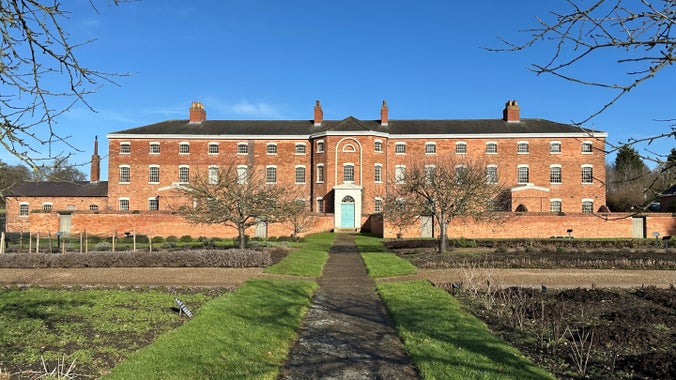
| M | T | W | T | F | S | S |
|---|---|---|---|---|---|---|
Open
Closed
| Asset | Opening time |
|---|---|
| Workhouse & Infirmary | 10:30 - Last admission 15.00 |
| Café | 10:30 - 15:00 |
| Ticket type | With Gift Aid | Without Gift Aid |
|---|---|---|
| Adult (18+) | £16.50 | £15.00 |
| Child (5-17) under 5s free | £8.30 | £7.50 |
| Family (2 Adults and up to 3 children) | £41.30 | £37.50 |
| 1 adult, up to 3 children | £24.80 | £22.50 |
| Group (Adult 18+) | £14.25 |
Second-hand bookshop
Café located in the Infirmary. Indoor and outdoor seating available. The café is open for hot and cold drinks, pasties, snacks, cakes and ice cream. Food and drink is not permitted inside the historical buildings.
Free parking, 200 metres away from the property. what3words ///holly.disposing.acclaim
Dogs are allowed outside anywhere on site. Assistance dogs only in the historic buildings.
Guided tour available on a first-come first-served basis at various times throughout the day.
Guidebooks and small souvenirs can be purchased from the visitor reception building.
Toilets are available in the visitor reception building, Infirmary cafe and in the hub.
Blue Badge parking. Accessible toilets. Ramped entrances. Upper floors are stairs only. Fully accessible outdoors route.
Accessible toilets can be found in the visitor reception building, the hub and the Infirmary cafe.
Accessible parking available in the main visitor car park, 200 metres from the property.
There is a lift in the Infirmary.
There is some narrow access in The Workhouse building.
We have two mobility scooters available to hire. Please speak to a member of the team on arrival.
There are steps to the upper floors of The Workhouse.
Find out more about visiting The Workhouse and Infirmary, where guided tours, exhibitions and activities help bring to life the stories of the people who had to work to receive food, shelter and medical care here.

Find out all you need to know about accessibility at The Workhouse & Infirmary so you can make the most of your visit.

Bring your education or school group to The Workhouse and Infirmary in Nottinghamshire. Step back in time to the 1840s and find out what life was like inside this gruelling institution. All visits are self led, giving you the opportunity to design your day around your group's learning needs.

See the details of all upcoming events taking place at The Workhouse and Infirmary.
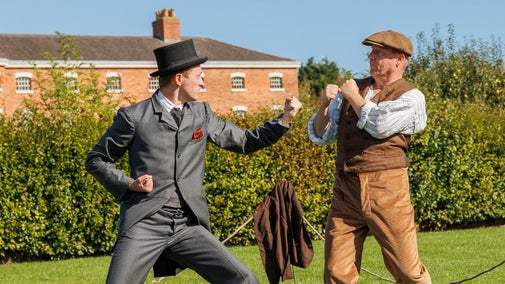
Workhouse built in 1824, a last-resort refuge for the poor and destitute, now one of the best-preserved examples in the country.
The Infirmary, which supported ill Workhouse inmates, eventually adapted its role and response to care until decommission in the 1980s.
Various vegetable plots, orchards and rich pasture that once supplied food for Workhouse inmates, now nurtured by volunteers for purchasable produce.
Comfortable and reflective café offering a range of hot and cold drinks, pasties, croque monsieurs, bakes and sweet treats. Seating indoors and outdoors, including a dog-friendly area.
Is it time for some nanty narking? Have you seen the size of that parish pick axe? Go back in time to the 1800s and uncover the meaning behind delightful words and phrases used in the Victorian era.

Join Side Farm Flowers at The Workhouse for a relaxed, small-group workshop creating a luxury planted spring wreath using British-grown flowers, bulbs and seasonal foliage.
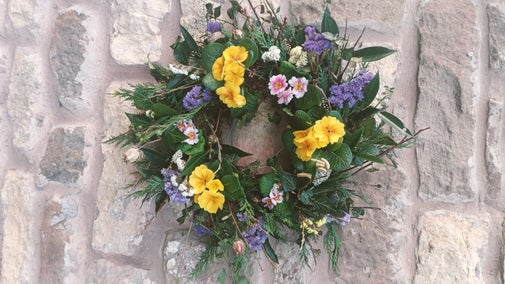
There are lots of ways to keep the family engaged at The Workhouse and Infirmary. With children's trails, seasonal activities and dress up.

From plot to pauper plate, explore the recreated Victorian vegetable garden and admire the range of heritage varieties grown.

Located on the ground floor of the Infirmary, the café serves a range of hot and cold drinks, pasties, croque monsieurs, bakes and sweet treats. Whether you’re popping by for a takeaway coffee, staying for lunch or collecting supplies for a picnic, you’ll find something that hits the spot. Guidebooks and small souvenirs can be purchased from the visitor reception building. Take a look inside the second-hand bookshop and get lost in a world of your own. With fiction, hobbies, classics and children's books, there’s something for everyone to enjoy including our new children's corner.
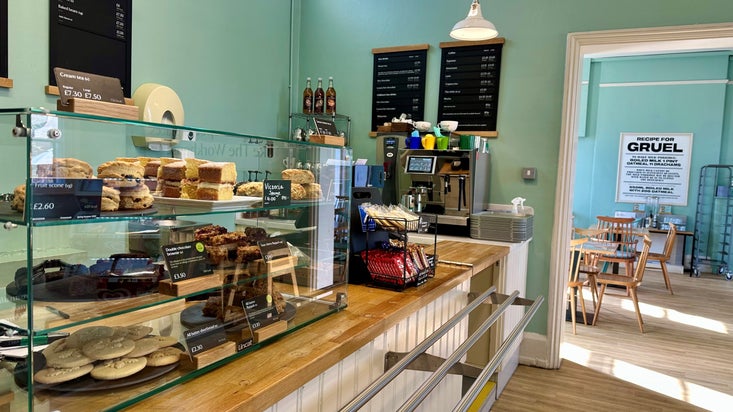
A fun trail for all ages discovering the long lost words of Victorian slang.
The kitchen garden at The Workhouse & Infirmary was both a place of labour and a source of food. Discover more of it's history on this free tour with a member of our skilled gardens team.
Step back in time at The Workhouse and Infirmary. Meet our costumed characters and learn about what life was like for the inmates who lived here.
Come and enjoy a social walk around Southwell and discover more of the local area surrounding The Workhouse.
Make a luxury Spring planted wreath using British grown, spring flowering plants, locally grown bulbs, pesticide free dried flowers, assorted foliage. A relaxed, friendly 3 hour creative session (includes a hot drink and cake)
Step back in time and join Reverend John T. Becher, founder of The Workhouse, on a tour of Southwell.
This spring, treat the whole family to a world of adventure at The Workhouse and Infirmary on an Easter trail.
Come along to this 2 hour workshop and let your creativity flow. Make your own mini garden in a vintage pot with a collection of mini living plants/cacti/succulents. Children must be supervised by a parent / guardian. £45
Built in 1824 as a last resort for many people, this rural workhouse is one of the best preserved and most complete in England. It was designed to house around 160 inmates, who lived and worked in a strictly segregated environment with virtually no contact between the old and infirm, able-bodied men and women, and children.
As the site developed, the Infirmary was built in 1871 to care for those deemed too ill to be housed in the workhouse. Here you can glimpse the beginnings of an emerging healthcare system, as social care evolved.
Interactive media, personal objects and the stories of those who lived and worked here help to bring the history to life.
'An empty workhouse is a successful one' - Rev. J T Becher (founder of Southwell Workhouse)
In collaboration with family history website Findmypast, we've been exploring the 1921 Census of England and Wales. It's helped us get closer to the lives of people at The Workhouse and Infirmary, where we've revealed dozens more stories of inmates and patients from the last decade of The Workhouse era. Discover more about these stories while visiting the property, as well as research from nine other places in our care. By clicking on this page, you’ll access a third-party website. Please see their privacy policy for how they handle your personal data.

Learn about the concept and the history of The Workhouse and Infirmary and the role that they played.
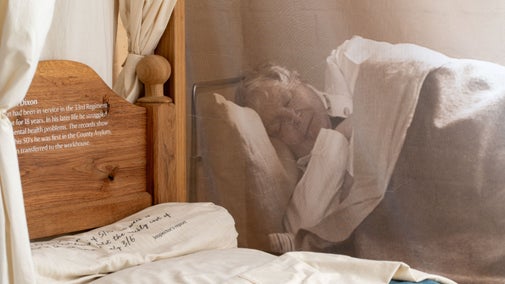
The Bi-centenary Banner produced by local artist Vanessa Stone has taken pride of place at the Workhouse and Infirmary. The colourful and collaborative piece is now hung up on permanent display in the exhibition area. Created in July, the banner was based on an original black and white drawing that Vanessa scaled up and had printed onto 100% cotton. Visitors of all ages came along and coloured it in with all sorts of animals, patterns, colours and people.
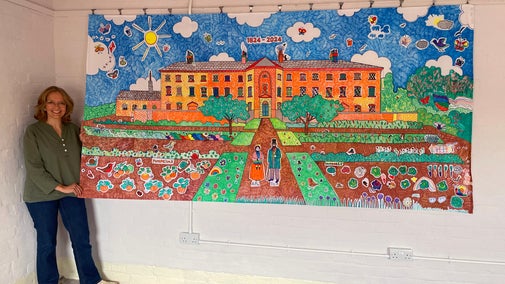
Take a sneak peek into the treasure trove that is the collection of The Workhouse and Infirmary and learn what these objects tell us about the history of this special place.

Discover how we care for The Workhouse and the items in its collection, including original Victorian wallpaper from the Infirmary.

One way to support the National Trust, while also spending time in amazing places and making new friends, is to volunteer. Find out more about joining the dedicated team of volunteers working to make The Workhouse and Infirmary a fascinating place to visit.
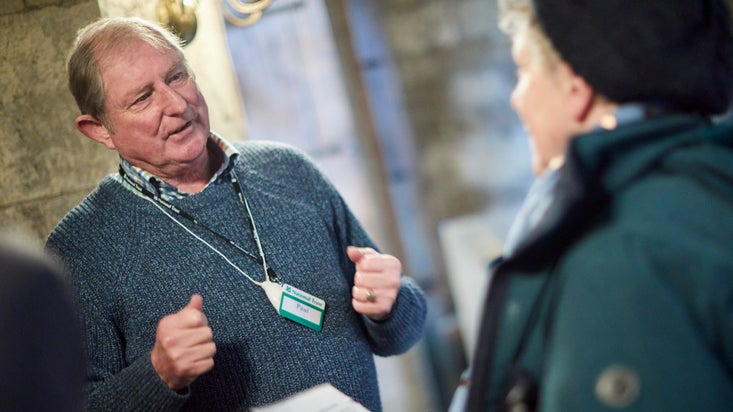

Join today and help protect nature, beauty and history – for everyone, for ever. Enjoy access to more than 500 places with National Trust membership.
By sharing your email address you’re agreeing to receive marketing emails from the National Trust and confirm you’re 18 years old or over. Please see our for more information on how we look after your personal data.